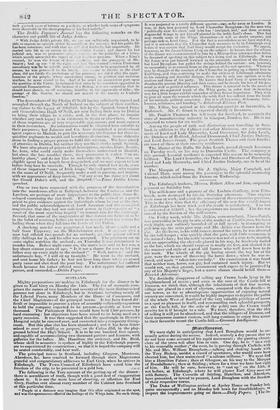The Edinburgh bankers, Messrs. Robert Allan and Son, suspended payment
on Saturday last. The Edinburgh bankers, Messrs. Robert Allan and Son, suspended payment on Saturday last.
The mill-house and a granary of the Lochrin distillery, near Edin- burgh, were destroyed by fire on Saturday afternoon. Nine engines were soon at work, and saved the remainder of these extensive premises. This is the first time that the efficiency of the new tire establishment at Edinburgh has been tried, and the result is staisfactory. 'Inc loss is estimated at 10,000/. ; but the proprietors arc insured. The time was caused by the friction of the mill-stones. On Friday week, while Mr. Aitkin, corn-merchant, ?einsselburgh, was proceeding in his gig to amid the market at I laddington, his horse took fright, and suddenly bounded off at full speed : in attempting to pelt him up, the reins gave way, and Mr. Aitkin was thrown front the gig. As the horse, in his wild career, neared the town, he was observed by the toll-keeper ; who quickly shut the gate, with little ceremony, in the animal's face ; but the noble creature was not of a race to be daunted, and on approaching the obstacle placed in his way, lie fCarlessly dashed at the bar, which we should suppose is nearly six feet, and cleared it in the manner and style of a good old hunter who well knew bow to do his work. The wheels of the gig having struck the top bar of the gate, were the nicans of throning the horse down ; when he was se- cured, and again " taken into custody." On examination it was found that neither man, horse, nor gig, had sustained much injury. But we would not, on that ground, recommend such capers to be practised by any of his Majesty's lieges, lest a worse chance should befall them.— Beru•ick Advertiser.
We decidedly disapprove of' selling any Crown lands lying in the neighbourhood of towns ; • and even in the case of the Castle-hill at Dunoon, we think that, although the inhabitants of that fine marine, village are placed in a sort of elysium, compared with the dwellers in our towns, as far as advantageous opportunities of enjoying natural scenery are concerned, it would be highly improper to deprive the public of the whole West of Scotland of the very valuable privilege of access to a spot so pleasant in itself, and commanding such splendid prospects, as the Castle hill, for the sake of the paltry sum the Crown would receive for it if brought to a sale. We trust, therefore, that the idea of selling it will yet be abandoned, and that the villagers of Dunoon, and their numerous summer visiters, will long continue to enjoy free access to their favourite resort the Castle-hill.—Greenock Intelligeneer.
















 Previous page
Previous page